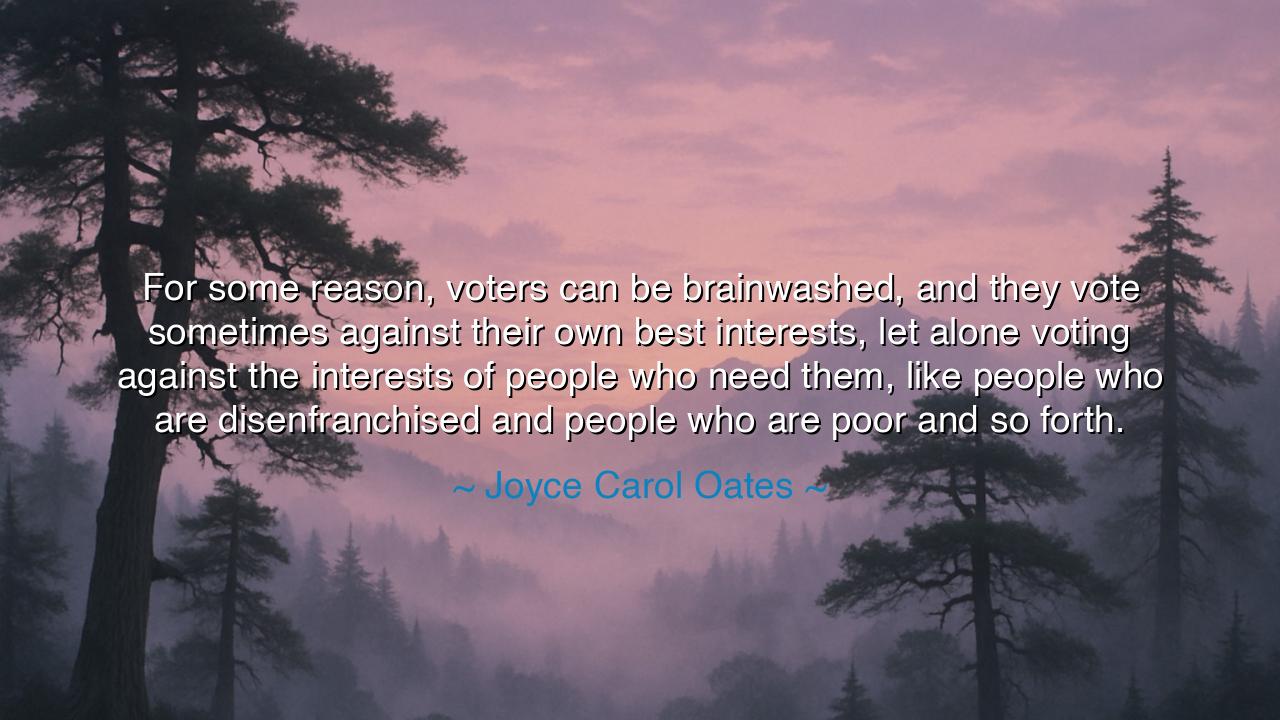
For some reason, voters can be brainwashed, and they vote
For some reason, voters can be brainwashed, and they vote sometimes against their own best interests, let alone voting against the interests of people who need them, like people who are disenfranchised and people who are poor and so forth.






"For some reason, voters can be brainwashed, and they vote sometimes against their own best interests, let alone voting against the interests of people who are disenfranchised and people who are poor and so forth." These words from Joyce Carol Oates reveal a deep and troubling truth about the state of democracy—the vulnerability of individuals to be swayed, manipulated, and misled in matters of public policy and election. Voters, entrusted with the power to shape their societies, can sometimes be driven to cast their ballots in ways that betray not only their own well-being but also the needs of the most vulnerable members of society. This phenomenon speaks to the fragility of reason, the power of propaganda, and the influence of those who seek to exploit the masses for their own gain.
In the ancient world, the idea of manipulation and persuasion was well-known to philosophers, who understood the dangers of mass influence. Plato, in his Republic, warned of the dangers of demagoguery, where leaders appeal to the emotions and desires of the people rather than to their reason and wisdom. The Sophists, who were skilled in the art of persuasion, often used flattery, deception, and empty promises to sway public opinion. Socrates, in contrast, sought to awaken the reason of the people, believing that only through the pursuit of truth and understanding could true justice and righteousness be achieved. His method was one of dialogue and examination, meant to counteract the misleading influence of those who would use rhetoric to manipulate the masses.
Consider the Roman Empire, which, at its peak, saw the rise of emperors who used the power of bread and circuses—providing food and entertainment—to placate the masses. The people, distracted by fleeting pleasures, were often unable to see the long-term consequences of their actions or the policies they endorsed. In this way, the rulers of Rome managed to maintain control over a vast empire, even when the well-being of the common people was severely neglected. Voters in this case, the citizens of Rome, were swayed not by the realities of their conditions but by the distractions and false promises of those in power, much like how modern-day politicians use media and rhetoric to cloud the truth.
In modern history, the manipulation of the masses through propaganda is all too familiar. Joseph Goebbels, the chief propagandist for the Nazi regime, was a master of crafting narratives that played on fear, anger, and prejudice. His campaign convinced the people of Germany to support policies that were not in their best interest and led to the suffering of millions. Similarly, in democratic nations, we often see how elections can be swayed by misinformation, fear-mongering, and the manipulation of emotions. This phenomenon is a stark reminder that the truth is not always what is presented to the public, and the people's best interests are not always served by the leaders they choose.
One of the most painful examples of this betrayal can be found in the civil rights movement in the United States. In the years leading up to the 1960s, many white voters—despite the obvious moral and social imperative to support equality for African Americans—voted against the Civil Rights Act and Voting Rights Act. These votes were often influenced by deep-seated racial prejudices, fear of change, and the misleading rhetoric of segregationist leaders. The disenfranchised—the poor, the oppressed, the marginalized—were denied their rights, not because they lacked power, but because many voters, out of ignorance or self-interest, chose to preserve the status quo, even at the cost of the moral fabric of the nation.
The lesson of Oates' quote is a sobering one: voters must remain vigilant and thoughtful, for the choices they make not only affect their own lives but the lives of those who have no voice—those who are disenfranchised, poor, or marginalized. The heart of democracy is not just the right to vote, but the duty to vote wisely. Freedom cannot be maintained if the citizens are misled or fail to see beyond their immediate concerns. We must, as individuals, cultivate the wisdom to understand the larger consequences of our choices and to ensure that the vulnerable are protected, not abandoned.
In our own lives, we must take responsibility for our choices and the impact they have on the world around us. We must seek the truth, not as it is presented by those in power, but as it is revealed through careful reflection, education, and understanding. We must resist the forces that seek to manipulate us through fear, misinformation, or the promise of short-term gain. Only by doing so can we ensure that our actions are truly in our best interest and in the interest of those who are most in need. Let us not be brainwashed, but instead strive to be informed, compassionate, and wise in every decision we make. Through such vigilance, we preserve the dignity of democracy and uphold the well-being of all.






AAdministratorAdministrator
Welcome, honored guests. Please leave a comment, we will respond soon